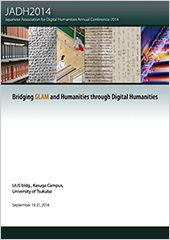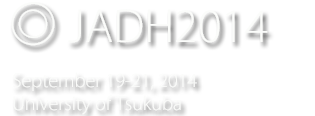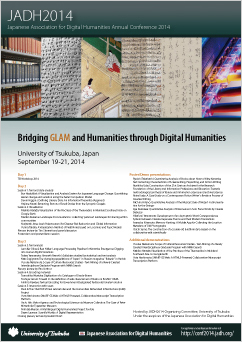Abstracts
PDF version
Published by the International Institute for Digital Humanities, Tokyo, Japan
ISBN 978-4-9906708-5-6
© 2014 Japanese Association for Digital Humanities

Download (PDF 1.5MB)
HTML version
Friday, 19 September
TEI Workshop 2014
Kiyonori Nagasaki
Saturday, 20 September
Session 1: Text and Data Analysis
A Visualization and Analysis System for Japanese Language Change: Quantifying Lexical Change and Variation using the Serial Comparison Model
Bor Hodošček, Makiro Tanaka, Hilofumi Yamamoto
Defining Literary Data: An Information Theoretical Approach
Devin Higgins, Thomas Padilla, Arend Hintze
Extracting Factors of Small Stories from the Synoptic Gospels
Hajime Murai
Session 2: Visualization
Visualization of the Practices of the Theravadins in Mainland Southeast Asia on Google Earth
Makiko Harada, Julien Bourdon-Miyamoto, Hidenori Watanave
Landscape Documentation: Collecting “Personal” Landscapes for Sharing within Communities
Tsuyoshi Tamura, Shoko Sumida, Mariko Kaname
Aceh Paleotsunami Reconstruction for Disaster Risk Reduction and Global Information
Nurjanah Jane, Hidenori Watanabe
A Visualization Method of Field Notes based on Locations and Topic Models
Yurina Takata, Hidenori Watanave, Masayuki Yanagisawa, Taizo Yamada
Plenary Lecture and Panel
Life on the Outside: Collections, Contexts, and the Wild, Wild Web
Tim Sherratt
Sunday, 21 September
Session 3: Text Analysis
Language Processing Pipeline for Narrative Emergence: Digging into Human Rights Violations
Ben Miller, Jennifer Olive, Ayush Shrestha, Nicolas Subtirelu, Jin Zhao, Yanjun Zhao
Kenneth Rexroth’s Syllabism Studied by Statistical and Text Analysis
Takeo Yamamoto
The Changing Appellations of “Japan” in Russian Magazine Rubesh in Harbin
Mao Sugiyama
Scope of Cultural Resources Studies: Text-Mining of a Newly Created Interdisciplinary Graduate Program with MIMA Search
Yusuke Nakamura, Hideki Mima, Katsuya Masuda, Chikahiko Suzuki
Plenary Lecture
Developing and Sustaining Digital Humanities Partnerships
Paul Arthur
Session 4: Encoding Materials
Digitization of a Catalogue of Oracle Bones
Tomohiko Morioka
Toward to the Definition of Safe Character Set of Nushu in ISO/IEC 10646
Toshiya Suzuki
Textual Encoding for Government-Designated Textbooks (Kokutei Tokuhon)
Akihito Kawase, Toshinobu Ogiso
Session 5: Interaction with Users
NeCTAR Virtual Laboratories and the Humanities Networked Infrastructure (HuNI) Project
Paul Arthur, Deb Verhoeven
SMART-GSWeb: A HTML5-Powered, Collaborative Manuscript Transcription Platform
Yuta Hashimoto
A Multilingual Digital Humanities Project for Asia
Nirmala Menon
Sōseki’s Worlds: A Digital Representation
Dawn Lawson
Closing Plenary Lecture
Harold Short
Poster Session
Quantitative Analysis of Books about How to Write Narrative Text: Extracting Characteristics of Screenwriting, Playwriting, and Fiction Writing
Ryoichi Takahashi, Hajime Murai, Takehiro Inohara
Construction of 21st Century Archives for the Research Foundation of the Library and Information Professions and Education: Towards a Methodological Synthesis of Library and Information Science and Archival Science
Norihiko Uda, Yuko Yoshida, Tetsuya Shirai
A Case Study of a Contemporary Fiction Writer’s Revision Process for Creative Writing
Akira Kudo, Takeshi Okada, Dominick Chen
Quantitative Analysis of the Musical Style of Mozart: How Many Persons Should Play Eine Kleine Nachtmusik?
Michiru Hirano, Hajime Murai, Takehiro Inohara
Quantitative Analysis of Dissonance in Solo Piano Works by Claude Debussy
Aya Kanzawa, Akihiro Kawase, Hajime Murai, Takehiro Inohara
Development of an AsymptoticWord Correspondence System between Classical Japanese Poems and their Modern Translations
Hilofumi Yamamoto, Bor Hodošček, Hajime Murai
Memory Hunting: A Mobile App for Collecting the Location Metadata of Old Photographs
Asanobu Kitamoto
The Construction of Accurate Old Landform Data based on the Collaborative Edit Scientifically
Yoichi Seino, Mamiko Mataza, Takafusa Iizuka

